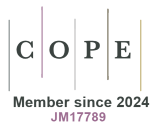Most read articles by the same author(s)
- Aileen Murphy, Antoinette D.I. Van Asselt, Mental health economics: the Netherlands experience , Global and Regional Health Technology Assessment: Vol. 7 No. 1 (2020): January-December 2020
- Aileen Murphy, Exploring the Advancing Function of Health Technology Assessments , Global and Regional Health Technology Assessment: Vol. 4 No. 1 (2017): January-December 2017









